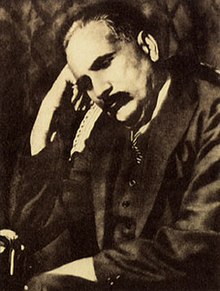Sir Muhammad Iqbal
|
Dr. Sir Allama Muhammad Iqbal محمد اقبال |
|
|---|---|
 |
|
| Born |
Muhammad Iqbal 9 November 1877 Sialkot, Punjab, British India |
| Died | 21 April 1938 (aged 60) Lahore, Punjab, British India |
| Other names | Poet of the East شاعر مشرق |
| Alma mater |
Scotch Mission College (F.A.) Government College (B.A., M.A.) University of Cambridge (B.A.) University of Munich (Ph.D.) |
| Notable work | Asrar-e-Khudi, Rumuz-e-Bekhudi, Payam-e-Mashriq, Zabur-e-Ajam, Javed Nama (more works) |
| Era | 20th-century philosophy |
| Region | British Raj |
|
Main interests
|
Urdu poetry, Persian poetry, Law |
|
Notable ideas
|
Two-nation theory, Conception of Pakistan |
Sir Muhammad Iqbal (Urdu: محمد اقبال ) (November 9, 1877 – April 21, 1938), widely known as Allama Iqbal (علامہ اقبال), was a poet, philosopher, and politician, as well as an academic, barrister and scholar in British India who is widely regarded as having inspired the Pakistan Movement. He is called the "Spiritual father of Pakistan". He is considered one of the most important figures in Urdu literature, with literary work in both the Urdu and Persian languages.
Iqbal is admired as a prominent poet by Pakistanis, Indians, Iranians, Bangladeshis, Sri Lankans and other international scholars of literature. Though Iqbal is best known as an eminent poet, he is also a highly acclaimed "Muslim philosophical thinker of modern times". His first poetry book, Asrar-e-Khudi, appeared in the Persian language in 1915, and other books of poetry include Rumuz-i-Bekhudi, Payam-i-Mashriq and Zabur-i-Ajam. Amongst these, his best known Urdu works are Bang-i-Dara, Bal-i-Jibril, Zarb-i Kalim and a part of Armughan-e-Hijaz. Along with his Urdu and Persian poetry, his Urdu and English lectures and letters have been very influential in cultural, social, religious and political disputes.
...
Wikipedia
